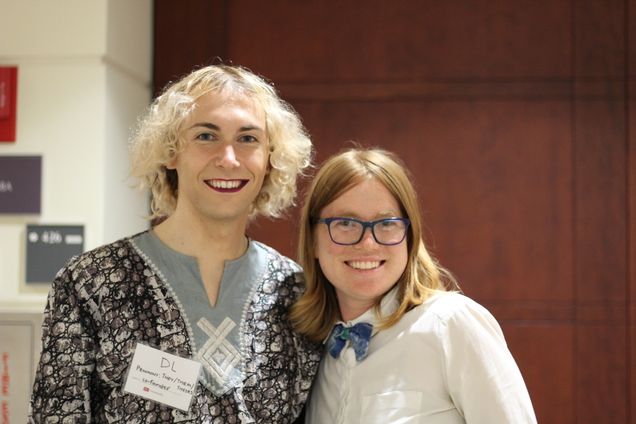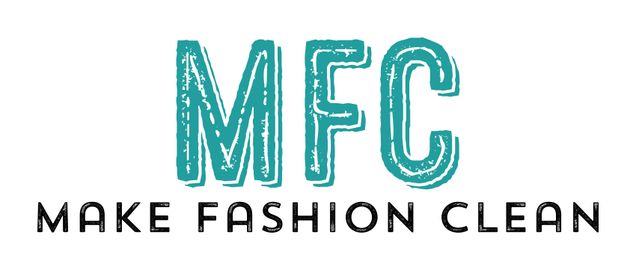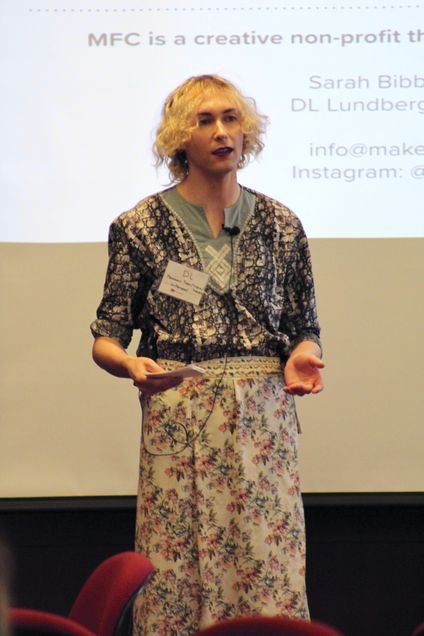Dielle Lundberg (SPH’19), Making Upcycled Fashion Come Full Circle
For the latest updates about the MFC Tie-Dye Inc. (Make Fashion Clean) project, visit the project website at makefashionclean.org or check out Dielle’s 5 years post-Summer Accelerator reflections.

In just a few years, Dielle Lundberg (she/her or ze/hir) (SPH’19) went from an undergrad conducting research in Ghana to becoming the co-founder of Make Fashion Clean (MFC), a non-profit that is committed to creating sustainable fashion while employing people in Ghana displaced by the secondhand clothing trade and people in the community looking for work in the creative economy but encountering barriers to doing so.
How do you create innovation?
I believe innovation occurs through listening and research. While some amazing ideas do indeed happen overnight, I think most important and contextually relevant social impact work happens very slowly – through getting to know a person or a population for a long time before starting any type of innovation work.
Who or what inspires you to create impact?
I suppose I am inspired by two sources – the first is the people I work with, my team members, collaborators. Seeing their energy, their drive, their commitment, their hopefulness renews my own passion every day. The other source I guess is my curiosity. I have a relatively low threshold for what I find interesting, and so any time that I get to learn about something new or work on some new challenge, I get excited. This trait can also, of course, be a problem when I need to stay focused on the task-at-hand.
Tell us how your role in MFC started:

In 2014, I met Matilda Lartey while I was conducting research in Ghana. Matilda is a seamstress, a businesswoman, and a mother of a daughter with a disability. Given my interests in disability rights, we became close friends over my two years living in Ghana.
In 2016, we decided to come together to create a few pieces of sustainable fashion to sell in the US and create employment for displaced artisans in the community. This resulted in co-founding a non-profit, non-governmental organization called the Matilda Flow Inclusion (MFI) Foundation. I co-founded Make Fashion Clean (MFC) in 2017 to try to make a sustainable non-profit business that could sustain the MFI Foundation.
What problem are you hoping to solve with MFC?
MFC creates living wages and social inclusion with artisans in Ghana, West Africa. Many of these artisans have been put out-of-work as a result of the international secondhand clothing trade, which decreased local demand for Ghana-made clothing.
MFC is addressing this problem at the root by raising awareness in the US about how to upcycle, reuse, and downcycle clothes locally so that the secondhand clothes do not travel to countries like Ghana. We also create upcycled products with artisans in Ghana to sell back to the US consumer, creating a full-circle of sorts for upcycling used jeans.

What has been the biggest challenge or obstacle you had to overcome in your role or for your new venture? How did you do it? What did you learn from the experience?
Honestly, one of the biggest challenges of this project has just been explaining it to people. The project has multiple components – an environmental justice component, a disability component, a women’s empowerment component.
To us, it makes sense because people have intersectional identities, but trying to share this project in a 30-second or 2-minute elevator pitch is challenging. We had to learn that it is not necessary and also not possible to share every component all the time. I am proud that we have really done the research and behind-the-scenes work to figure out how to frame this project in an authentic way that will also be most likely to resonate with our audience.
Who do you turn to for mentorship and advice?
I turn to my mentors at the BUild Lab. Over the summer accelerator, I was assigned to two mentors, who are now a part of the MFC advisory council. I also, of course, turn to MFC’s board of directors.
What is one major accomplishment you’re most proud of?
I am very proud of MFC’s new product design for the Blue Circle Bag. Upcycling is very core to our mission today, but two years ago, when we were first starting out, we started out by using regular, non-organic fabrics. When I was unable to trace where these fabrics were coming from, I started researching more about the environmental impact of fashion. I had no idea that fashion is an environmental polluter on a similar scale to the oil industry and other major polluters.
Armed with this information, we started importing organic cotton to Ghana from Mali – but managing this supply chain was very difficult. The decision to start upcycling secondhand clothes was originally one of convenience, and it wasn’t until a few weeks into upcycling, that we realized how important upcycling was going to be to our work on a social and environmental impact level. I’m proud that we took the time to really research our supply chain, think through the environmental and social impact of the supply chain, and realize there was a much better material to be using right in front of us!
What advice would you give to someone starting their own innovation journey right now?
My advice would be to find one or two people who are willing to WhatsApp or text message with you every day about your project. My co-founders and I have been messaging every day about this project for well over two years. It’s these conversations that have moved us forward and kept us motivated.
Two years from now, what do you hope to be doing? What keeps you motivated to get there?
MFC’s vision is to grow the global market for artisans by employing people and helping individuals build skills. This will allow artisans to provide for their families while redirecting fabrics out of landfills and into the circular economy.
I hope that MFC will still be selling Blue Circle Bags and will have expanded in scale from 10 workers at the MFI Foundation in its transitional employment program to 20 workers. I also hope our team has completed a large amount of research on the project to evaluate its social impact holistically.
What’s next for MFC?
 MFC is launching a Kickstarter for our new product – the Blue Circle Bag. The Kickstarter begins Friday, November 2 and ends Giving Tuesday, November 27. After conducting market research during the summer accelerator, we created the Blue Circle Bag to combine function and durability with a stylish design that would appeal to thoughtful humans who are searching for a hand-crafted bag with a story.
MFC is launching a Kickstarter for our new product – the Blue Circle Bag. The Kickstarter begins Friday, November 2 and ends Giving Tuesday, November 27. After conducting market research during the summer accelerator, we created the Blue Circle Bag to combine function and durability with a stylish design that would appeal to thoughtful humans who are searching for a hand-crafted bag with a story.
When you’re not busy with class and working for MFC or school work, what do you like to do?
I love to write fiction, so you can usually find me curled up at Cafe Nero with my double cappuccino, typing furiously!



